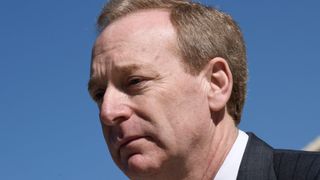Gobsmacked Microsoft president says UK's regulator blocking the Activision deal is company's 'darkest day'
The decision is "bad for Britain" says Brad Smith, not at all ominously.

Microsoft president Brad Smith is not a happy bunny. Yesterday the UK's Competition and Markets Authority, in a move that took almost everyone by surprise, blocked Microsoft's proposed acquisition of Activision Blizzard. It's a decision that could scupper the entire deal, though no-one's yet sure of the ramifications. And so Smith is on the warpath about what a boneheaded, plain wrong, backwards-ass move the CMA has made.
"We're of course very disappointed about the CMA's decision but more than that, unfortunately, I think it's bad for Britain," Smith told BBC World News. "The strong message the CMA has sent is not just to surprise everyone who fully expected this acquisition to be approved, but to send a message that I think will discourage innovation and investment in the United Kingdom, and I think in that sense the impact of this decision is far broader than on Microsoft or on this acquisition alone."
Ominous enough, but Smith was just getting warmed-up: Note in particular the ludicrous implication that an independent regulator pissing off Microsoft has implications for UK national security.
"Microsoft has been in the United Kingdom for 40 years and we play a vital role, not just supporting businesses and non-profits but even defending the nation from cyber-security threats," said Smith. "But this decision, I have to say, is probably the darkest day in our four decades in Britain. It does more to shake our confidence in the future of the opportunity to grow a technology business in Britain than we've ever confronted before."
Rather starkly, Smith added that if the UK wants to bring in investment, "it needs to look hard at the role of the CMA and the regulatory structure".
Finally, Smith takes the chance for a bit of a low blow: Brexit remains a deeply divisive issue in the UK, so he throws some political shade. "People are shocked, people are disappointed, and people's confidence in technology in the UK has been severely shaken. There's a clear message here: the European Union is a more attractive place to start a business than the United Kingdom."
While no-one would expect Microsoft to have taken this decision well, Smith's reaction does seem a tad histrionic. It also feels like it's taking aim at the UK government and business policies, which are rather distinct things from the UK's independent competition regulator.
The biggest gaming news, reviews and hardware deals
Keep up to date with the most important stories and the best deals, as picked by the PC Gamer team.
The CMA, for its part, said through a spokesperson that its job is to do what's best for the people of the UK, "not merging firms with commercial interests." On whether this will scupper the deal entirely, the CMA said: "Activision is intertwined through different markets: it can't be separated for the UK. So this decision blocks the deal from happening globally."
The CMA's chief executive, Sarah Cardell, appeared on the Today programme and was asked about Smith's remarks.
"I think this decision shows actually how important it is to support competition in the UK and that the UK is absolutely open for business," said Cardell. "We want to create an environment where a whole host of different companies can compete effectively, can grow and innovate."
Both Microsoft and Activision have said they will appeal against the CMA's decision. Regulators in the US and EU have yet to make their decision, though the US Federal Trade Commission has begun a legal challenge to the takeover. For the deal to go through, it will have to win regulatory approval in all three regions. Don't expect Microsoft to give up on this one easily though: If the deal fails, it'll be on the hook for a cool $3 billion "breakup fee" to Activision Blizzard.
Rich is a games journalist with 15 years' experience, beginning his career on Edge magazine before working for a wide range of outlets, including Ars Technica, Eurogamer, GamesRadar+, Gamespot, the Guardian, IGN, the New Statesman, Polygon, and Vice. He was the editor of Kotaku UK, the UK arm of Kotaku, for three years before joining PC Gamer. He is the author of a Brief History of Video Games, a full history of the medium, which the Midwest Book Review described as "[a] must-read for serious minded game historians and curious video game connoisseurs alike."

Yakuza/Like a Dragon creator Toshihiro Nagoshi says his studio's new game won't be that big after all: 'it's not modern to have similar experiences repeated over and over again'

'Calm down!' says Facepunch Studios: Garry's Mod successor s&box is getting a fan-requested sandbox mode and an alternative to 'Sausage Men'
Most Popular





